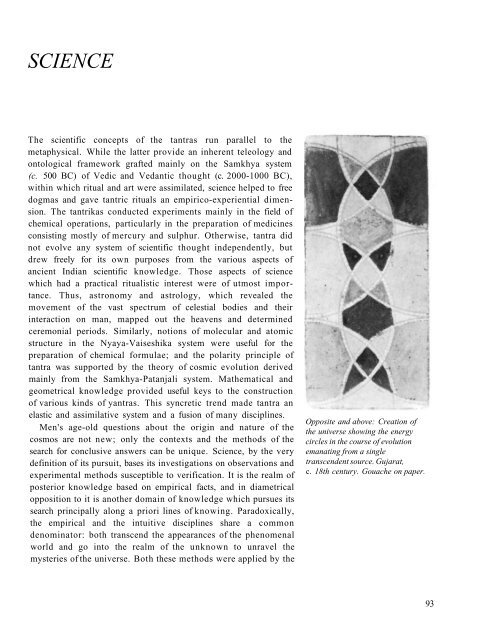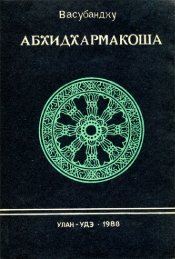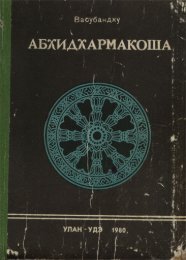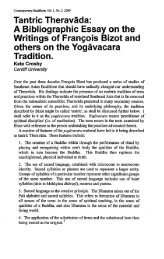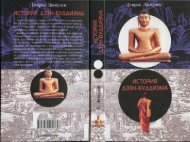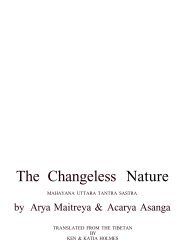You also want an ePaper? Increase the reach of your titles
YUMPU automatically turns print PDFs into web optimized ePapers that Google loves.
SCIENCE<br />
The scientific concepts of the tantras run parallel to the<br />
metaphysical. While the latter provide an inherent teleology and<br />
ontological framework grafted mainly on the Samkhya system<br />
(c. 500 BC) of Vedic and Vedantic thought (c. 2000-1000 BC),<br />
within which ritual and art were assimilated, science helped to free<br />
dogmas and gave tantric rituals an empirico-experiential dimension.<br />
The tantrikas conducted experiments mainly in the field of<br />
chemical operations, particularly in the preparation of medicines<br />
consisting mostly of mercury and sulphur. Otherwise, tantra did<br />
not evolve any system of scientific thought independently, but<br />
drew freely for its own purposes from the various aspects of<br />
ancient Indian scientific knowledge. Those aspects of science<br />
which had a practical ritualistic interest were of utmost importance.<br />
Thus, astronomy and astrology, which revealed the<br />
movement of the vast spectrum of celestial bodies and their<br />
interaction on man, mapped out the heavens and determined<br />
ceremonial periods. Similarly, notions of molecular and atomic<br />
structure in the Nyaya-Vaiseshika system were useful for the<br />
preparation of chemical formulae; and the polarity principle of<br />
tantra was supported by the theory of cosmic evolution derived<br />
mainly from the Samkhya-Patanjali system. Mathematical and<br />
geometrical knowledge provided useful keys to the construction<br />
of various kinds of yantras. This syncretic trend made tantra an<br />
elastic and assimilative system and a fusion of many disciplines.<br />
Men's age-old questions about the origin and nature of the<br />
cosmos are not new; only the contexts and the methods of the<br />
search for conclusive answers can be unique. Science, by the very<br />
definition of its pursuit, bases its investigations on observations and<br />
experimental methods susceptible to verification. It is the realm of<br />
posterior knowledge based on empirical facts, and in diametrical<br />
opposition to it is another domain of knowledge which pursues its<br />
search principally along a priori lines of knowing. Paradoxically,<br />
the empirical and the intuitive disciplines share a common<br />
denominator: both transcend the appearances of the phenomenal<br />
world and go into the realm of the unknown to unravel the<br />
mysteries of the universe. Both these methods were applied by the<br />
Opposite and above: Creation of<br />
the universe showing the energy<br />
circles in the course of evolution<br />
emanating from a single<br />
transcendent source. Gujarat,<br />
c. 18th century. Gouache on paper.<br />
93


